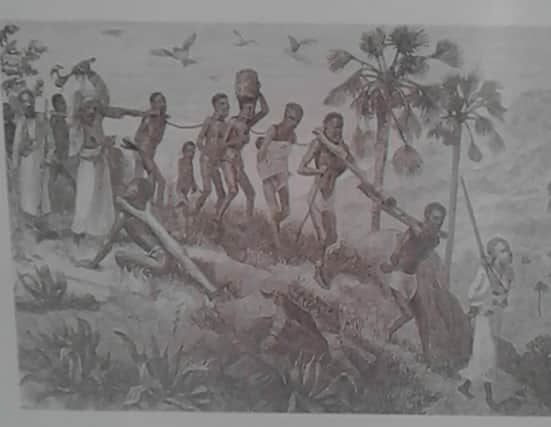Scotland's role in slavery explored in free university course


Academics at Glasgow University have worked with colleagues at The University of the West Indies in Jamaica to produce the material which will bring the legacy of slavery right up to date by linking it to racial inequality and present-day global protests.
The online course will take learners on a 350-year journey from West Africa and the Caribbean through to the Windrush Generation and the present day.
Advertisement
Hide AdAdvertisement
Hide AdHistory of Slavery in the British Caribbean, which will run for four weeks on the leading social learning platform, FutureLearn.com, is now open for registration and will go live on Monday 12 October during Black History Month.
Dr. Peggy Brunache, lecturer in the history of Atlantic Slavery and Director of the Beniba Centre for Slavery Studies at the University of Glasgow, is the lead contributor on the course from Glasgow along with Dr Christine Whyte.
Dr Brunache said: “The past is not over. The past is still the present.
“While the abolition of the slave trade and racial slavery occurred in the early 19th century, the structures of racial inequality and anti-black racism have never dissipated. Does that mean that every white British citizen is racist? Of course not.
“However, these structures of power remain infused into the very fabric of contemporary society, privileging those who identify as white and especially those with generational wealth. It’s as insidiously active in the Commonwealth Caribbean as much as it is in the British metropole.”
The multi-disciplinary course draws on the expertise of academics in the UK and Caribbean, artists and descendants of enslaved Africans.
Dr Christine Whyte, is a historian of West Africa and a lecturer in Global History based at the University of Glasgow, said: “The important thing about this course is its emphasis on British involvement in slavery, which was both long-lasting and significant to many aspects of British society and economy, and its focus on the words of the enslaved to describe their own experiences.”
The new course continues the partnership formalised last year when the University of Glasgow and The University of the West Indies (The UWI) signed a Memorandum of Understanding (MoU) to launch The Glasgow Caribbean Centre for Development Research.
Advertisement
Hide AdAdvertisement
Hide AdContributors to the course from The UWI include historians from different territories across the multi-campus Caribbean university - Dr Zachary Beier, Dr Tara Inniss, and Dr Shani Roper.
Dr Beier said: “I thought this was a great opportunity to demonstrate how academic collaboration between the United Kingdom and the Caribbean is an important step in rectifying the history of exploitative and unbalanced relationships between these regions.”
“Additionally, this course provided an opportunity to share information about significant historical archaeological research in the Caribbean islands and material culture collections stored at The UWI. The UWI plays an important role in ensuring the significant history and cultural resources of the Caribbean are properly considered and accessible to an increasingly interested global community.”
People who take part in the course will be encouraged to reflect on their own family history and look for the legacies of slavery in their own community.